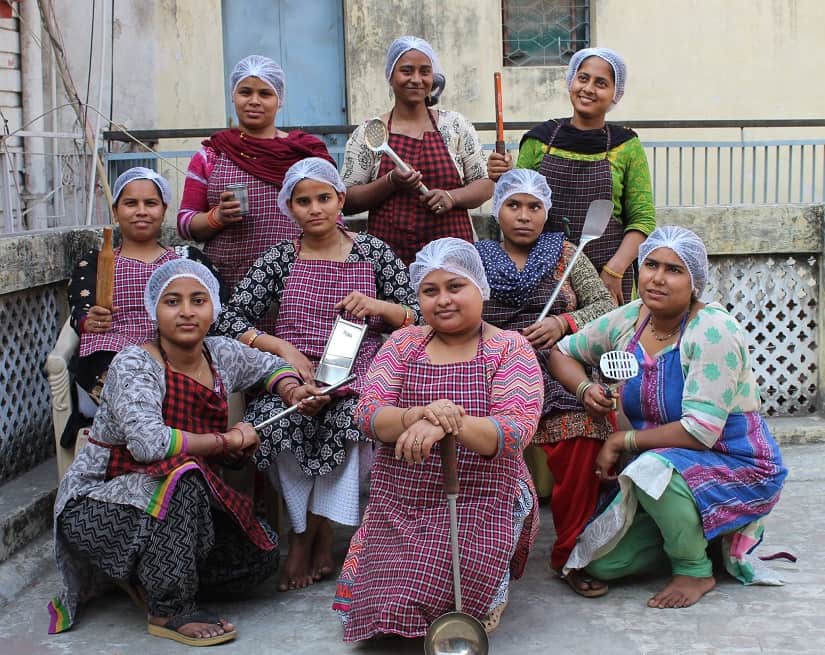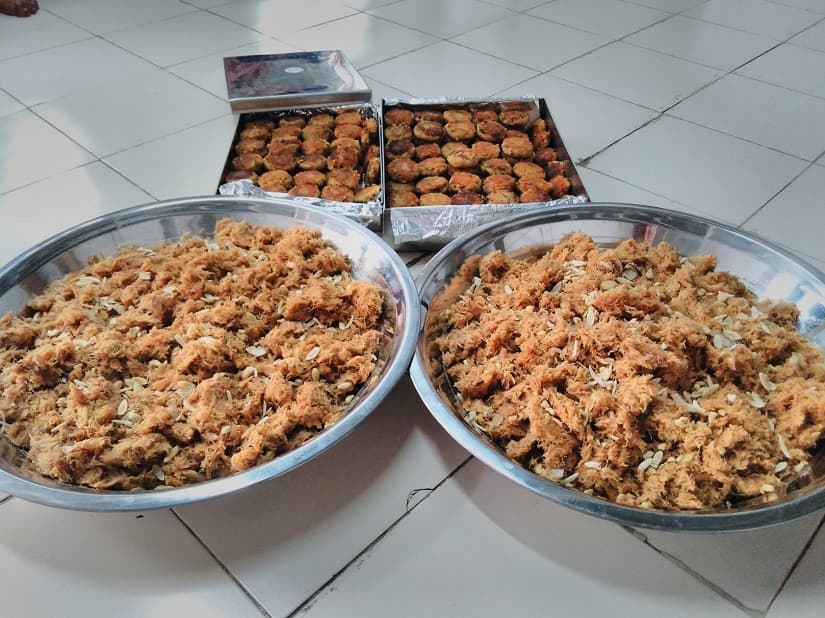Nizamuddin’s Delhi is a romantic, thriving metropolis whose cuisine has historically been integral to Delhi’s food. Sharanya Deepak meets Zaika-e-Nizamuddin, an all-women catering outfit that serves the kebabs, biryani, haleem, and laddoos, that Nizamuddin is most famous for.
This article was originally published on
Goya Journal and has been reproduced here with due permission. *** By Sharanya Deepak It is a Monday afternoon in Nizamuddin, and the weekly market is bursting with activity. Young mothers wander around, the line in front of the butcher intensifies; in Nizamuddin Basti, the 700-year-old neighbourhood in the heart of the New Delhi, time stands still. I am here to visit Zaika-e-Nizamuddin, a catering and delivery kitchen that works from within Nizamuddin, selling traditional home-cooked food to customers all over Delhi. As I walk into their office, the kitchen smells of ground masalas, as the cooks wrap up a meal for a large group. “Just give me a minute,” says Noorjahan, the group’s supervisor, as she walks in with her young son who is dripping wet from having jumped into a fountain nearby. Besides Noorjahan, the team at Zaika-e-Nizamuddin, (which translates to the food of Nizamuddin,) is made up of Fatima Khatoon, Sakina, Shehnaz Begum, Kulsum, Saiba, Neha, Fatima, Moina, and Rubina. The menu that the women cook includes mutton and chicken biryani, shammi kebabs, a Nizamuddin special korma, and haleem, a laborious and beloved Delhi dish cooked with all parts of the animal, and garnished with coriander and onions. “It looks simple,” says Noorjahan, as she reads over the menu. “But we make these in the real way of old Nizamuddin — for example, the biryani is scented, and has anchar (pickle) in with the meat. This is typical of the Basti.” [caption id=“attachment_7062591” align=“alignnone” width=“825”]
 The women of Zaika-e-Nizamuddin. All images via facebook/@Zaika.e.Nizamuddin[/caption] Zaika-e-Nizamuddin began in 2012 under the Nizamuddin Urban Renewal Initiative of the Aga Khan Development Network, when a study conducted in 2010 by Ambedkar University found that more than 50 percent of children that live in the area are malnourished. To battle the junk food that children consume, which the study found was the main cause of malnourishment, women were brought together to make laddoos and namkeen (salty snacks), to provide a healthy alternative. Under the Aga Khan development project, in which many aspects of Delhi’s cultural heritage are preserved, Zaika-e-Nizamuddin expanded into a women’s self-help group that would cook and sell food native to the Basti. The women at Zaika emphasise freshness – all their ingredients are procured on order from local sellers; the orders, and the delivery is highly personalised, and constantly evolving. “We realised we wouldn’t make much money from this — but it was good to work,” said Fatimah Khatoon. “And then the idea came to us, that when people come here [to the Basti] for meetings, they too need food. So what if we started to cook it ourselves?” “The initiative struck a chord with many of the city’s residents who take pride in its culture,” says Noorjahan, as she recalls feedback from customers. “We made a lot of mistakes in the beginning, but slowly, through feedback and and awareness of what the market wanted, we became better.”
![zaika3-min]()
When they started out, Fatimah says the women made around ₹200 a month. They are now earnings up to ₹6000 a month per person, and more for a communal kitty that they circulate among themselves. Apart from deliveries, Zaika caters to parties, trainings, bulk orders for organisations, and hosts pre-booked meals and pop-ups for guests in their kitchen space in Nizamuddin. They also participate in food fairs, like the one held every Sunday at Sunder Nursery. The Basti, densely populated with more than 12,000 inhabitants, was built 700 years ago around the settlements that followed Syed Muhammad Nizamuddin Auliya, one of the Indian subcontinent’s best-known saints. The neighbourhood has a thriving history — of poetry, cuisine and artisanal trades — that has flourished through the centuries, and remains one of Delhi’s most vibrant concentrations of culture. Today, the Nizamuddin Dargah stands tall as one of Delhi’s finest architectural gems, and the streets that surround it sell its culinary treasures: Ghalibs for buff kebabs, Hussaini Hotel for Nihari. But despite all of this, the Basti remains ghettoised, with little attention for governments at state and centre for the same. At Zaika-e-Nizamuddin, the women are part of this culture, preserving the recipes, they tell us, from the time of kings. While cooking comes easily to them, the the challenge lies in making sure that food tastes like home. “This is a self-help group, but it also gives the women charge,” said Swati Batra, the Foundation’s Women’s Livelihood coordinator. “They are doing what they already know how to do.” [caption id=“attachment_7062721” align=“alignnone” width=“825”]
 Some of the delicacies from the Zaika-e-Nizamuddin kitchen[/caption] Under the present supervision of Noorjahan, the women operate on a linear chit system, in which each woman has a turn. And as orders roll in, it is determined how many women are needed, and they are then called into work. The chit system ensures that everybody gets a turn to work, and that there is flexibility. When there is a large order, all the cooks gather together. “Of course, there are times when it’s not my turn, but I still come to help,” chuckles Fatimah Khatoon. “My favourite thing about working here has been making friends with all of these women,” she says, as Noorjahan and the others tidy up the kitchen. “Before, we would argue a lot, but now we are one big unit – we are together in what we want to do.” Zaika-e-Nizamuddin has found the perfect balance between the formal and the informal; where the women work in friendship towards tangible, material and aspirational goals. While Delhi’s sprawling food culture evolves into furnished cafes, modern contemporary spins on Indian cuisine, it is within its oldest walls that its love for food originates. In Delhi 6, sweet shops that are centuries old keep memories of its kings alive; in Mehrauli, old kebab shops remind us of a more diverse, vibrant time in the capital. Nizamuddin, in the same vein, is a part of Delhi’s history in which the capital was a romantic, thriving metropolis — a place that those born into are still loyal, even as the city changes around them.
![zaika7-min]()
Despite this, the Basti’s variety and diversity of cuisine still escapes Delhi’s diners. To cook and sell to the other residents is a form of agency in a place where women are not typically provided agency. While the Basti’s cuisine has been lauded in history, scholarship and contemporary culture, it has always been the men who have represented it; its women invisible in the discourse. “In the beginning, it was so hard to get out,” adds Noorjahan. “Everyone would talk about us behind our back, family members would object. But now we support one another here, and we have profits to show for it.” “My husband runs a biryani stall outside, and I have to help everyday when I get back,” she continues. “Two days ago, he told me — don’t go to work, help me. And I told him — I’ve just completed a sale for more than ₹25,000! After that, he had nothing to say.” Sharanya Deepak is a writer presently living in New Delhi. Her work has previously appeared in Tehelka Magazine and Roads and Kingdoms. Goya Journal explores and celebrates the complex, layered relationships we share with food.


)
)
)
)
)
)
)
)
)



